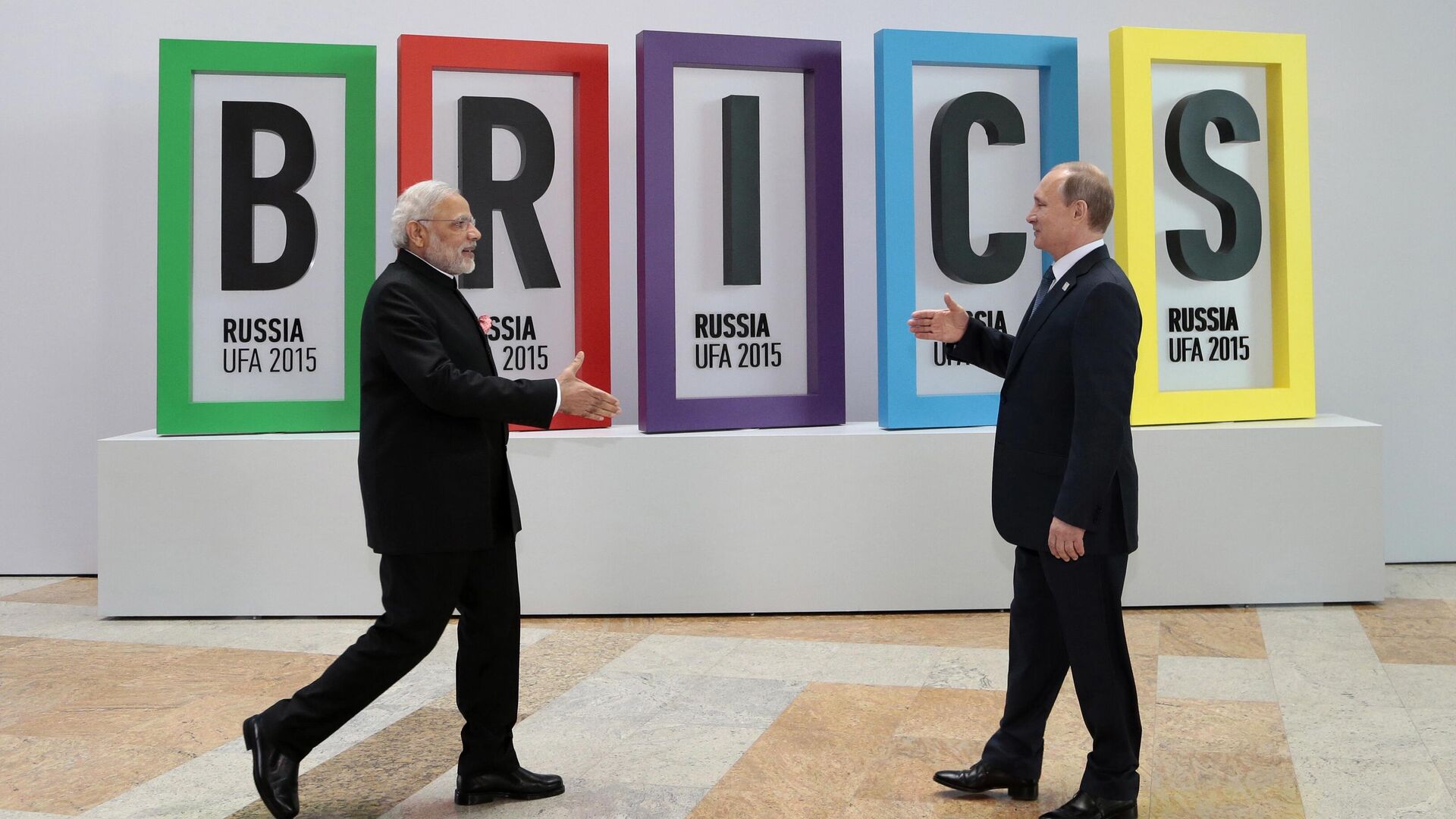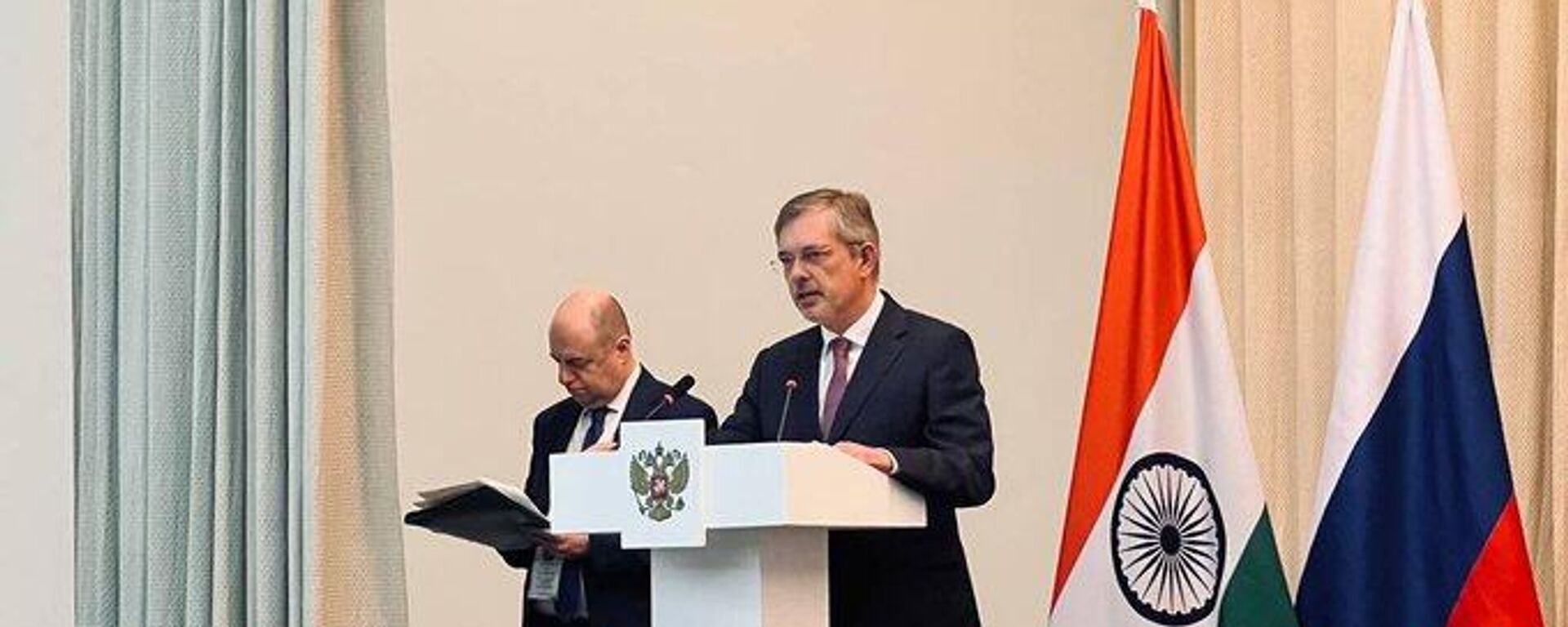https://sputniknews.in/20240517/brics-solidarity-prospects-of-modis-participation-in-swiss-summit-on-ukraine-look-slim-7390284.html
BRICS Solidarity: Prospects of Modi's Participation in Swiss Summit on Ukraine Look Slim
BRICS Solidarity: Prospects of Modi's Participation in Swiss Summit on Ukraine Look Slim
Sputnik India
The participation of Prime Minister Narendra Modi in the West-backed 'Swiss Peace Summit' to advance Ukrainian President's Volodymyr Zelensky's '10-point peace formula' are increasingly slim due to post-election dynamics.
2024-05-17T18:34+0530
2024-05-17T18:34+0530
2024-05-17T18:34+0530
ukraine conflict
volodymyr zelensky
vladimir putin
ukraine
russia
india
ministry of external affairs (mea)
brics
ukraine armed forces
special military operation
https://cdn1.img.sputniknews.in/img/07e8/04/05/7049168_0:107:3259:1940_1920x0_80_0_0_d4846c9e752e1d5d5408d20c7af4aa36.jpg
The participation of Indian Prime Minister Narendra Modi in the West-backed 'Swiss Peace Summit' to advance Ukrainian President's Volodymyr Zelensky's so-called '10-point peace formula' are increasingly slim due to post-election dynamics in the South Asian nation, according to former diplomats and academics.The results of the ongoing Lok Sabha election in India are slated to be announced on 4 June. Italian Prime Minister Giorgia Meloni has already extended an invitation to Modi to attend the G7 Summit in Puglia, Italy on 13-15 June.While Modi is expected to attend the G7 Summit in Italy in line with his participation in previous years, there's little chance that he would travel to Switzerland.Similar views were echoed by veteran Indian diplomats at an event at the Jawaharlal Nehru University (JNU) last week, emphasising underscored Modi's presence in India after the Lok Sabha election was more critical than his presence in Switzerland.For its part, Moscow has rejected the so-called 10-point peace plan, with Foreign Minister Sergey Lavrov stating that it wasn't feasible or realistic.Any Peace Process Without Russia's Participation Bound to FailNew Delhi has consistently maintained that it is in favour of direct talks between Russia and Ukraine to resolve the Ukraine conflict. The Ministry of External Affairs (MEA) has said that it yet to take a call on Ukraine's invitation to attend the Swiss summit.Significantly, there is also an overwhelming sentiment in India's strategic community that any peace settlement in Ukraine without Russia's participation is bound to be "futile".The comments come against the backdrop of Ukrainian and western attempts to lobby the Global South countries, including the BRICS states, to attend the Swiss summit.Zelensky had personally asked Modi to join the Ukrainian Peace Formula during their meeting on the margins of the G7 Summit in Hiroshima last May, following which New Delhi attended several meetings held under the 'Copenhagen Peace Format'. However, India has been viewed as wary of backing the unilateral peace plan.Professor Singh from JNU highlighted that India's foreign policy had turned increasingly "transactional" and "de-ideologized" in recent years."These broader foreign policy trends indicate that New Delhi could join the Swiss Peace Summit. The question is at what level India would be represented," Singh stated.'Presence of Russia and Ukraine More Important than Others'Ambassador Trigunayat stated that the presence of Russia and Ukraine held the key to resolve the Ukraine conflict.He noted close coordination of the positions of Russia and China on the way forward on the Ukraine conflict during President Putin's summit with President Xi Jinping in Beijing on Thursday.A joint statement after Putin-Xi talks stated that in order to reach "a sustainable settlement of the Ukrainian crisis, it is necessary to eliminate its root causes", apparently a reference to NATO's expansion near Russia's eastern borders.Xi stated at a joint press conference that Beijing was ready to play a "constructive" role in resolving the Ukrainian conflict.
https://sputniknews.in/20240428/zelenskys-peace-formula-for-ukraine-has-no-takers-in-india-russian-ambassador-7235412.html
ukraine
russia
india
china
south africa
italy
us
Sputnik India
feedback.hindi@sputniknews.com
+74956456601
MIA „Rossiya Segodnya“
2024
Dhairya Maheshwari
https://cdn1.img.sputniknews.in/img/07e6/0c/13/138962_0:0:641:640_100x100_80_0_0_2cb44360dbcdf6d84bf4b299cd045917.jpg
Dhairya Maheshwari
https://cdn1.img.sputniknews.in/img/07e6/0c/13/138962_0:0:641:640_100x100_80_0_0_2cb44360dbcdf6d84bf4b299cd045917.jpg
News
en_IN
Sputnik India
feedback.hindi@sputniknews.com
+74956456601
MIA „Rossiya Segodnya“
Sputnik India
feedback.hindi@sputniknews.com
+74956456601
MIA „Rossiya Segodnya“
Dhairya Maheshwari
https://cdn1.img.sputniknews.in/img/07e6/0c/13/138962_0:0:641:640_100x100_80_0_0_2cb44360dbcdf6d84bf4b299cd045917.jpg
swiss peace summit, russia india ties, russia india relations, swiss peace conference, zelensky's peace formula, ukraine peace formula, russia india ties, russia india relations, russian oil exports, pivot to asia, western sanctions on russia, russian oil exports, modi putin summit, modi putin telephone call, brics summit
swiss peace summit, russia india ties, russia india relations, swiss peace conference, zelensky's peace formula, ukraine peace formula, russia india ties, russia india relations, russian oil exports, pivot to asia, western sanctions on russia, russian oil exports, modi putin summit, modi putin telephone call, brics summit
BRICS Solidarity: Prospects of Modi's Participation in Swiss Summit on Ukraine Look Slim
Brazilian President Luiz Inácio Lula da Silva's office has confirmed to Sputnik that he won't take part in the Swiss summit. The office of South African President Cyril Ramaphosa has also stated that he won't be attending the Swiss event due to "post-election events".
The participation of Indian Prime Minister Narendra Modi in the West-backed 'Swiss Peace Summit' to advance Ukrainian President's Volodymyr Zelensky's so-called '10-point peace formula' are increasingly slim due to post-election dynamics in the South Asian nation, according to former diplomats and academics.
The results of the ongoing Lok Sabha election in India are slated to be announced on 4 June. Italian Prime Minister Giorgia Meloni has already extended an invitation to Modi to attend the G7 Summit in Puglia, Italy on 13-15 June.
While Modi is expected to attend the G7 Summit in Italy in line with his participation in previous years, there's little chance that he would travel to Switzerland.
Professor Swaran Singh, the Chair of Centre for International Politics, Organization and Disarmament (CIPOD) at School of International Studies, Jawaharlal Nehru University (JNU) said that Modi would be kept busy with post-election events.
"India would definitely watch how other major powers are responding to the Swiss Peace Summit. I am not too hopeful of the Prime Minister joining the Swiss conference due to post-electoral considerations," Singh told Sputnik India.
Similar views were echoed by veteran Indian diplomats at an
event at the Jawaharlal Nehru University (JNU) last week, emphasising underscored Modi's presence in India after the Lok Sabha election was more critical than his presence in Switzerland.
Former Foreign Secretary Kanwal Sibal described Zelensky's peace plan as flawed as it didn't involve Russia.
Ambassador (retired) Bhaswati Mukherjee, a former envoy to the Netherlands, cautioned that New Delhi shouldn't waste its political settlement on Kiev's peace plan till both Russia and Ukraine were present at the negotiating table.
For its part, Moscow has
rejected the so-called 10-point peace plan, with Foreign Minister Sergey Lavrov stating that it wasn't feasible or realistic.
Any Peace Process Without Russia's Participation Bound to Fail
New Delhi has consistently maintained that it is in
favour of direct talks between Russia and Ukraine to resolve the Ukraine conflict. The Ministry of External Affairs (MEA) has said that it yet to take a call on Ukraine's invitation to attend the Swiss summit.
Significantly, there is also an overwhelming sentiment in India's strategic community that any peace settlement in Ukraine without Russia's participation is bound to be "futile".
"I think that any attempt at any peace formula will be futile without the participation of all sides. If Russia is not invited it will be a waste of time," Ambassador Anil Trigunayat (retired), a former Indian envoy to Jordan, Libya and Malta, told Sputnik India.
"India has also maintained that participation of both Russia and Ukraine makes sense," the former Indian diplomat underlined.
The comments come against the backdrop of Ukrainian and
western attempts to lobby the Global South countries, including the BRICS states, to attend the Swiss summit.
Zelensky had personally asked Modi to join the Ukrainian Peace Formula during their meeting on the margins of the G7 Summit in Hiroshima last May, following which New Delhi attended several meetings held under the 'Copenhagen Peace Format'. However, India has been viewed as wary of backing the unilateral peace plan.
Professor Singh from JNU highlighted that India's foreign policy had turned increasingly "transactional" and "de-ideologized" in recent years.
"These broader foreign policy trends indicate that New Delhi could join the Swiss Peace Summit. The question is at what level India would be represented," Singh stated.
'Presence of Russia and Ukraine More Important than Others'
Ambassador Trigunayat stated that the presence of Russia and Ukraine held the key to resolve the Ukraine conflict.
He noted close coordination of the positions of Russia and China on the way forward on the Ukraine conflict during President Putin's summit with President Xi Jinping in Beijing on Thursday.
"President Putin was in China and would have gotten the feel of the Chinese stance since they were reportedly part of some preparations. Russia has found the Chinese 12-point Peace Plan most palatable. So, irrespective of who attends or not the Swiss Rendezvous, the key is the participation of two warring parties and not only the proxies," Trigunayat underscored.
A joint statement after Putin-Xi talks stated that in order to reach "a
sustainable settlement of the Ukrainian crisis, it is necessary to eliminate its root causes", apparently a reference to NATO's expansion near Russia's eastern borders.
Xi stated at a joint press conference that Beijing was ready to play a "constructive" role in resolving the Ukrainian conflict.



